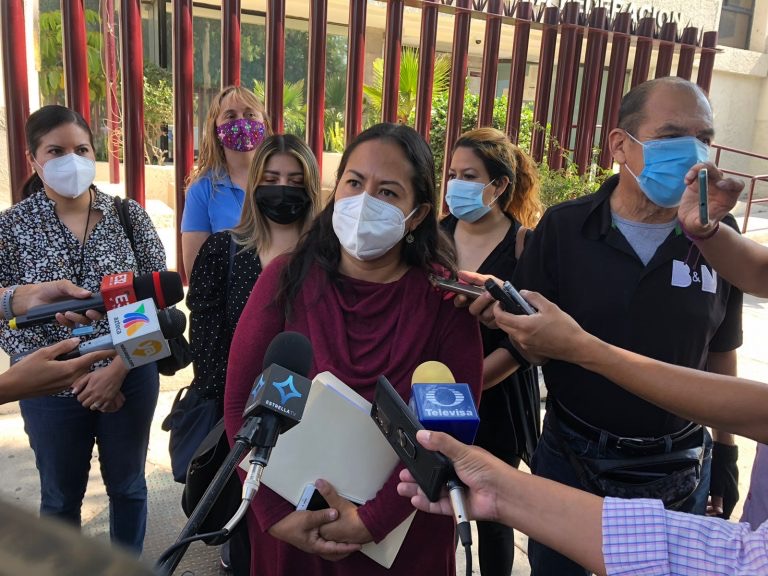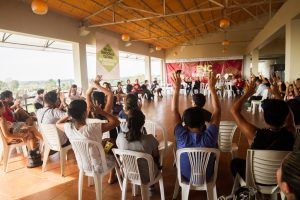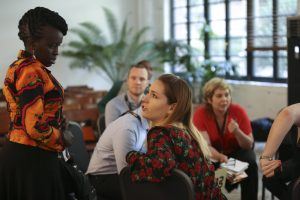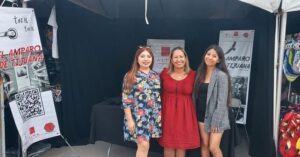Three Strategies for Community Justice
Tres estrategias de justicia comunitaria
Pepe and Maria traveled from El Salvador to Tijuana, Mexico. fleeing from a context where their nephew had been recruited by a drug cartel and their sister had been raped. They felt confident that their daughter was next. In 2018, before making it to the border, where they expected to seek asylum in the United States, they were illegally detained by the municipal police of Tijuana. The then-mayor had ordered the deportation of “migrants with poor behavior”.
This pattern of events is all too common in Tijuana. As of September 2022, Mexico had received 86,621 refugee applications from Central America and other countries, 2,768 of which were submitted in Baja California.
Alma Migrante, an organization working to guarantee migrants’ access to justice, led the case 1597/2018, which demonstrated that the local police turning in migrants for deportation to the migratory authorities is illegal in Tijuana. When authorities accept and maintain this illegal practice, they violate the right of access to information to know that this common interaction between the police and the migrants is actually illegal.
Although migratory authorities have informed that this resolution ended this illegal practice, in 2022 we are still receiving cases from Jamaican migrants that prove that the opposite is true.

A local community of defenders announce the definitive victory of Alma Migrante, A.C. in the litigation 1597/2018 in front of the constitutional courts of the city of Tijuana, Mexico.PHOTO: Credit: Alma Migrante
Alma Migrante, in collaboration with experts in e-justice and legal tech from ÏO Justice and local community advocacy groups, has fought against this interaction between the municipal police and migratory authorities, using citizen and community participation through open justiceAn open, independent, and impartial justice system serves as a foundation for better access to justice by fulfilling all people’s civil liberties and allowing individuals to more effectively protect... and artistic practices, such as:
- Using art to raise awareness on citizen rights. Rick Pozas D’s comic strip “Tijuana’s protection” was jointly developed with Alma Migrante, ÏO Justice, and Colectivo 1597 to raise public awareness on law through art.
- Using theater to engage the public. The scenic collective Seres Comunes developed a participatory process called “Salas de Urgencia”, which involves setting up a theatrical production for local hosts, and engaging the public in the design of the play. “Bienvenido, Bienhallado” is a play developed by artists from the Compañia del Sotano, whose script is co-written by playwrights Alfonso Cárcamo, Zoe Mendez and the people of Tijuana horizontally.
- Gathering and analyzing data on police abuse. ÏO Justice created a prototype of a platform for data collection and processing to gather evidence on actual events and shared it with Colectivo 1597Tj to support their monitoring efforts around citizen-police interactions.
Using these and other approaches, we seek to build an informed citizenry who can exercise their right to participation and contribute to a better understanding of how authorities must interact with the migrant population.
We are calling on government cooperation through the joint use of tools toward including the culture of rulings in the border culture, co-designing tools to document cases, and opening data through interoperability and technology transfer. We also seek collaboration with legal associations across the country and even the Federal Public Ombudsman to replicate the successes of Baja California’s courts in other Mexican cities.
If you want to collaborate and be part of this community effort, write to us at [email protected] and [email protected] to schedule a meeting and shape your proposals to continue weaving networks of open justice. In addition to forming collaborative networks, in particular, support in our communication, funding and staffing efforts in Tijuana. If you would like to support us, please let us know here.
Pepe y María llegaron del Salvador a Tijuana, México huyendo del reclutamiento de su sobrino por el narco, de la violación a su hermana y de la certeza de que pronto seguía su hija. Antes de llegar a la frontera en 2018 para solicitar asilo en Estados Unidos, fueron detenidos ilegalmente por la policía municipal de Tijuana. El entonces alcalde había ordenado que deportaran a las “personas migrantes que se portaran mal”.
Este patrón de sucesos es una historia que se vive todos los días en Tijuana, en donde al cierre de septiembre del 2022, México recibió 86,621 solicitudes de reconocimiento de la condición de refugiado de personas del triángulo norte de Centroamérica y otros países. De estas, 2,768 solicitudes fueron recibidas en Baja California.
Alma Migrante, una organización que busca garantizar el acceso a la justicia de personas migrantes, litigó el caso 1597/2018 que evidencia que la práctica de que la policía local entregue a personas migrantes a las autoridades migratorias para que las deporte es ilegal en Tijuana. Cuando las autoridades difunden o aceptan esta práctica ilegal, vulneran el derecho de acceso a la información de la población a saber que esta interacción típica de la Policía con las personas migrantes en realidad es ilegal.
Aunque las autoridades migratorias han informado que la sentencia ha terminado con la práctica ilegal en la ciudad, en 2022 seguimos atendiendo casos de víctimas de Jamaica que revelan que no es así.

Comunidad local de defensores anunciando la victoria definitiva de Alma Migrante, A. C. en el litigio 1597/2018 frente a los tribunales constitucionales en la ciudad de Tijuana, México.PHOTO: Credit: Alma Migrante
Alma Migrante, junto a especialistas en e-justicia y legaltech de ÏO Justice, organizaciones de arte y grupos de defensa comunitaria locales, ha combatido esa colaboración entre la Policía Municipal y Migración a través de la participación ciudadana y comunitaria a partir estrategias de justicia abierta y arte como:
- Utilizar el arte para dar a conocer el derecho a amparo. El cómic “El Amparo de Tijuana” realizado por Rick Pozas D con la colaboración de Alma Migrante, ÏO Justice y el Colectivo 1597, para que la ciudadanía entienda el derecho a partir del arte.
- Utilizar el teatro para involucrar a la ciudadanía. El Colectivo Escénico, Seres Comunes creó un proceso de participación denominado “Salas de Urgencia” el cual consiste en realizar una puesta en escena para anfitriones locales y así recabar las aportaciones de la audiencia, con la finalidad de que el público se vuelva parte del proceso de creación de la obra teatral. “Bienvenido, Bienhallado” es una obra realizada con artistas de la Compañía del Sótano, cuyo guión es co-creado por los dramaturgos Alfonso Cárcamo, Zoé Méndez y a la población Tijuanense, horizontalmente.
- Recolectar y analizar datos sobre abusos de autoridades. Para generar y abrir los datos sobre la persistencia de la práctica, ÏO Justice generó un prototipo de plataforma para la recolección y procesamiento de datos que constituyan evidencias sobre lo que realmente está pasando y con cuánta frecuencia, para las defensoras que integran el Colectivo 1597Tj en los monitoreos sobre la interacción con la policía municipal.
Con estas y otras estrategias buscamos que la ciudadanía informada sobre las revelaciones de la sentencia ejerza su derecho a la participación en forma libre y que repetidamente aporte para mejorar la comprensión de cómo debe actuar la autoridad frente a la población migrante.
Hacemos un llamado a la colaboración gubernamental mediante el impulso conjunto de herramientas útiles para la integración del contenido de la sentencia en la cultura fronteriza, para el codiseño de herramientas de documentación de casos y para la apertura de datos sobre su cumplimiento mediante la interoperabilidad tecnológica y la transferencia de tecnología. Asimismo, buscamos la vinculación con asociaciones litigantes en todo el país e incluso la Defensoría Pública Federal para que el logro de los tribunales de Baja California sea replicado en otras ciudades mexicanas.
Si quieres colaborar y ser parte de este esfuerzo comunitario escríbenos [email protected] y [email protected] para agendar una reunión y darle forma a tus propuestas para seguir tejiendo redes de justicia abierta. Además de formar redes colaborativas, en particular, buscamos apoyo en la difusión, inversión para desarrollo y personal en Tijuana, si quieres colaborar con alguna de estas estrategias escríbenos aquí.
No comments yet
Related Content
 Challenges and Solutions
Challenges and Solutions
Arts and Culture: The Next Open Government Frontier
You probably don’t associate open government with the arts very often, but they are more connected than you think. Their relationship usually manifests through initiatives...

Broken Links
How can open data help shine a light on political corruption and make political systems fairer and more inclusive? How can we further link people and data to create a…

Voices of Open Government
How do we do government differently? Listen to conversations with leaders who break the mold and fight for accountability and transparency in government on our new podcast.


Leave a Reply